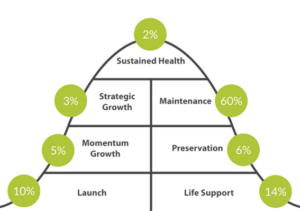3 Ways to Replace Busyness with Purpose in Your Ministry
More than 70 percent of pastors say they work between 55 to 75 hours every single week.
Those numbers may not surprise you. But they should.
Just like all the people you serve in ministry every week, you were created for a specific purpose—and that purpose isn’t fulfilled simply through activity and busyness.
You might think those late nights hunched over your computer and all those times you’ve skipped family meals are helping you fulfill your unique purpose.
But your purpose is more than what you do on Sunday mornings. It’s more than what you do in meetings and hospital visits. Those activities may help you fulfill your purpose, but they must not define your purpose.
Every pastor, just like every person, is driven by something. Many are driven by the pressures around them. Others are driven by responding to crises in their midst—and there are plenty of those, right? Some pastors are driven by the expectations of those they lead.
But God wants something more from us.
He wants us to live purpose driven lives. You can’t lead others to make the most of their lives if you’re not doing it. Just because you’re doing the activities of ministry doesn’t mean you’re pursuing your unique calling in life.
Often, our unique calling gets drowned out by random activity.
Consider what the apostle Paul shared with Timothy, a young pastor in his day, and his church in Ephesus. “Live life, then, with a due sense of responsibility, not as [people] who do not know the meaning of life but as those who do. Make the best use of your time”(Ephesians 5:15-16 PHILLIPS).
God expects us to make use of our time in ways that help us achieve what he has called us to do. Too often, though, we do everything but what really matters most.
I’ve got good news for you. You can do something about it.
Let me share three steps to organizing your life and ministry in a way that’ll help you achieve your life mission.
1. Develop your goals around your purpose.
Start with your unique purpose, which is rooted in God’s five purposes: worship, fellowship, discipleship, ministry, and evangelism. For this article, I’ll assume you’ve got that settled.
Goals put feet on your purpose. Think of them as statements of faith, typically phrased like this: “I believe God wants me to accomplish ____________ (what you’ll accomplish) by _________ (when you’ll do it).”
Set goals that you can’t accomplish without God’s help. Goals that require faith. Frankly, those are the only goals worth having. Jesus said, “According to your faith let it be done to you” (Matthew 9:29 NIV). God uses us to do the incredible when we trust him to do the impossible.
But make sure you’re chasing the right goals. Few realities will be more disheartening than reaching the end of your life and realizing you were successful in achieving a goal that didn’t matter.
Ask yourself these five questions as you set your goals:
- Will it glorify God?
- Does it make me more like Jesus?
- Will it make a positive contribution to the world?
- Does it enhance my life message?
- Can I do it in faith without doubting?
If you can answer these questions affirmatively (at least one of them and, hopefully, more than one), you know you have goals that matter, goals that will lead to a purpose driven life.
2. Organize your activities around your goals.
Many people have goals, but if your goals aren’t organized into actions and activities, your life won’t be purpose driven.
The best way to organize your activities is to categorize and prioritize them. Make a big laundry list of all the activities you need to do, but don’t just stop there.
Put together tasks that relate to one another. Your hospital visits. Put all your sermon preparation tasks together. Then rank them by importance.
The problem with many to-do lists is that the tasks can vary widely in value. If you’re living your life by a to-do list, you’re not purpose-driven, you’re activity driven.
Instead, organize your goals around the activities God wants you to do. You could do that many different ways.
I’ll tell you how I do it:
I organize my tasks around relationships—my relationship with God, my relationship with my family, my relationships at church, my relationships with other churches, and my relationships with the unchurched. This helps me stay balanced.
It’s easy in ministry to focus on serving others and ignore your own relationship with Jesus and your relationships within your family. Organizing your tasks around these relationships will help you avoid that.
3. Balance your schedule around your goals and activities.
Your schedule is ground zero for accomplishing God’s mission for your life. You can have great goals and focused tasks yet fail at fulfilling your mission if you miss this part.
You’ll have to schedule what’s important in your life. If you only have a 2 p.m. doctor’s visit on your schedule, it’s likely your whole day will revolve around that appointment.
Don’t let other people determine what’s important in your life. Schedule the tasks that matter to you, the tasks that will help you advance toward your goals.
The antidote to the frantic way many of us live in ministry is a schedule that’s planned and lived around our purpose.
I think of it like a tree. The roots of the tree are God’s five purposes for your life.
The trunk of the tree is God’s mission based upon your unique SHAPE, what God has called you to do. Then you have the branches, which are the five spheres (relationships) of life I mentioned earlier. The twigs coming out of those branches are the goals you’ve set to accomplish in those specific spheres. The pine needles are the activities and tasks you need to schedule in order to achieve your goals.
Everything is connected.
The roots of God’s eternal purposes nourish and provide the foundation for your purpose. Your unique purpose flows into the different spheres of your life. Your faith goals in each of those areas provide the momentum that moves you forward in your mission.
The scheduled tasks and actions within each of those goals provide the practical handles that ensure you complete your goals.
I know that many pastors feel as if their lives have gotten out of control. They’re busy going from meeting one need to another without the opportunity to really focus on their unique purpose.
But remember this. Time is not the issue. You have just enough time to do God’s will. If you try to do more than God’s will, you won’t have time. If you’re constantly running out of time, you’re either trying to do something that’s not God’s will or you’re doing it in the wrong way.
Stop letting your task list drive your life and your ministry.
Start letting God’s mission for your life drive your goals in all spheres of your life.
Article taken from Pastors.com and written by Rick Warren. Rick is the founding pastor of Saddleback Church, one of America’s largest and most influential churches.
Looking for a new position? Stop by MinistryJobs.com and have a look at the jobs that are available! Ministry jobs are hard to come by and job hunting is no fun. We help ministry job seekers find their ideal role in their next ministry – for free! More than 6 million search for a job every day. Be found! Looking to list a job or an open position? We help churches and organizations get job openings in front of potential candidates. We have several plans and packages available. Today is the day!
Want to read more Ministry Jobs Blogs? Click Here!
Follow us on social!
Facebook.com/MinistryJobs
Instagram.com/MinistryJobs




